I won’t say I was happy when my wife opened the oven of our brand new stove and her head was engulfed in a fireball because (1) I wasn’t, and (2) She would punch me very hard in the eyeball if I said that. Still, I will admit to thinking, as we sat in the emergency room—me trying to keep our toddler from firing up the defibrillator, her looking miserable with a goopy looking salve all over her face—that the experience could be professionally useful. Not for nothing is my second book called The Providence of Fire. People get burned, literally and figuratively, and here I had first-hand experience with a burn victim.
I’m happy to report that my wife healed up just fine (although the damage to our marriage when she reads this post may take more time). It just goes to show you, though, that everything is fodder when it comes to writing, especially if you’re writing epic fantasy. In fact, one of my favorite parts of the job has come to be the “research.” I put the word in quotes because, unlike more conventional methods involving spreadsheets, double-blind studies, and notecards, my research more or less involves keeping my eye out for awesome shit.
For instance, did you know that there’s a race that pits human runners against horses over a course that’s roughly a marathon? There is. Not only is this awesome in its own right, but it’s incredible useful to a fantasy writer trying to figure out which messengers are going to get to the battle when. Or we could talk about the Mt. St. Helens eruption or the caldera that is Crater Lake in Oregon. An extinct volcanic caldera would be a totally kick-ass place for a temple. Or a fortress. Or something. I wasn’t able to work it in this series, but that didn’t stop me from learning a lot about volcanic calderas.
One of my favorite types of research is the research I don’t even do myself. On a shockingly regular basis, readers get in touch with me to (1) Make suggestions, or (2) Point out things I’ve screwed up. I love both types of interaction. For instance, there was the surgeon and medical school professor who observed that one of the wounds incurred in The Emperor’s Blades seemed physiologically impossible. He said he’d actually made the relevant incisions on a cadaver with his students, and… nope, no dice. I leave it to the rest of you to figure out which it is.
These interactions are so much fun that I’ve actually started to go out looking for them. When I needed an injury that could lie dormant for weeks, then flare up and cripple a warrior all at once, I got in touch with the athletic trainer at the school where I used to work. We went back and forth for days about various knee, ankle, and hip injuries—all of which I was convinced I had by the end of this conversation.
Sometimes I just make shit up in the first draft of a book—an injury to a bird, for instance. I don’t know anything about bird anatomy, and so I just say something: the wing tendon reciprocator, blah, blah, blah. On the second pass, however, I try to do better. Recently, I managed to get in touch with a veterinarian who rehabilitates raptors. He gave me just what I needed for my wounded bird—a patagial tear. It’s such a specialized piece of knowledge that Microsoft Word keeps telling me I’m spelling patagial wrong.
Sometimes I’m just lazy. I could probably figure out how high a tower needs to be in order for sailors to see it at sea from a day’s sail distant, but as it turns out, I know some math people who live for this kind of thing. A few days ago, these two math-savvy folks (one, the fantasy writer, Django Wexler) got into such a debate about tunnels and the curvature of the earth that they forgot all about me. My twitter feed was just square roots signs and Pythagoras for the rest of the afternoon. And I’ll tell you what—they solved the hell out of that problem.
Writing is wonderful work, but it can be lonely. I’m grateful for these “research” opportunities, not just because I get to learn some cool stuff, but even more, because I get to interact with interesting, curious people. The generosity of readers is overwhelming, and it makes a day spent at the keyboard a delight. That said, I’m not letting my wife get any more ovens. She’s done her part already—if you pay close attention in the second book, you’ll see just which descriptions were helped out by her research.
After teaching literature, philosophy, history, and religion for more than a decide, Brian Staveley began writing epic fantasy. The Providence of Fire, the second installment in the Chronicle of the Unhewn Throne, publishes January 13th from Tor and Tor UK. He lives on a steep dirt road in the mountains of southern Vermont, where he divides his time between fathering, writing, husbanding, splitting wood, skiing, and adventuring, not necessarily in that order. He can be found on Twitter at @brianstaveley and also on his blog.










